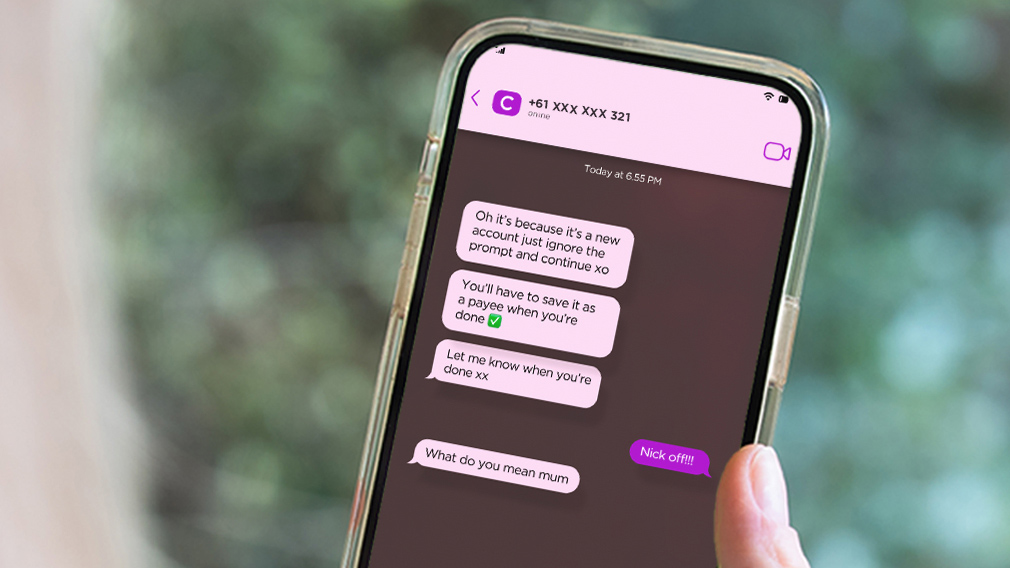“Nick off!” Mum catches out a scammer, with Westpac’s help

An SMS exchange via smartphone reveals the moment a mum realised she was being scammed. (Kalp Sanghvi)
When Westpac customer Eleanor* received a text from her 28-year-old daughter Cara saying she had a new phone number, she thought nothing of it.
But after innocently texting with the person she thought was Cara, the mum almost found herself $1,000 worse off after falling victim to a common scam.
“I regularly text with Cara. She lives out of home, and we check in with each other all the time. So, when I got a message from a new number saying it was her but with a new SIM after her phone had been damaged, I didn’t have reason to pause,” said Eleanor.
After some back-and-forth, Eleanor received a text asking for her credit card details so her daughter could purchase a new phone, followed by a text promising she would be paid back. Eleanor was more than willing to help as she didn’t want Cara stranded without being able to contact her.
“I had no issues giving her money to ensure we could stay in touch and knowing she could make ends meet. And I knew it wasn’t the right thing to share my card details with anyone – but I didn’t hesitate to share them with who I thought was Cara.”
As it turned out, the Cara impersonator couldn’t get Eleanor’s credit card to work and asked Eleanor to transfer the money instead. Bank account details were supplied. It was only when prompted by Westpac’s SaferPay questions before she confirmed the funds transfer that Eleanor started to think she may be a victim of a ‘hey mum’ scam.
“As soon as that seed of doubt was planted – I called my daughter on the original number I had for her. She picked up her phone immediately – and I knew I had been had. I was furious. I locked my credit card straight away and reported it to Westpac.
“I normally would have left it – but couldn’t stop myself from telling the scammer to get stuffed! It felt like such an abuse of privacy and trust to impersonate my daughter.”
Westpac SaferPay prompts customers with questions before funds are transferred to a new account if detected to have a high scam risk. If customer responses suggest the payment is highly likely a scam, Westpac will not process the payment.
Powered by Artificial Intelligence (AI) and integrated into Westpac’s sophisticated fraud detection systems, it helps identify red flags without disrupting genuine payments.
Westpac’s Head of Fraud Prevention, Ben Young, says Eleanor’s case is not uncommon and customers should be wary of text messages from unknown numbers, even if claiming to be a relative with a new phone.
“Hey mum scams are popular among scammers because they can be easy and lucrative – taking advantage of a parent’s trust and willingness to help out their child,” Young said.
“While scams are declining, unsuspecting Australians continue to be targeted and lose money to scams – so we want people to be sceptical and vigilant. The fight against scams continues, and we are increasingly investing money and resources in new technologies and capabilities, like Westpac SaferPay, to keep our customers and their money safe.”
Tips to help protect yourself from a ‘hey mum’ scam
• Never send anyone money in a hurry: Take the time to pause and consider whether this could be a scam. An urgent request from a family member or business for money should be considered suspicious.
• Check-in with a loved one: If you receive a text from a new number claiming to be someone you know – call or text them on the number you originally had to check.
• Ask something personal: If you can’t reach your loved one on their original number, you can respond to the text from the new number asking them a personal question. If the answer is vague or general, it should be treated as a scam.
* Names have been changed at the request of the individuals involved.


